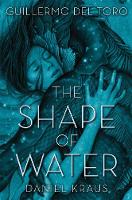Guillermo del Toro's The shape of water was the surprise winner of Best Picture at this year's Oscars. A surprise because "genre" films tend not to reap critical acclaim of this sort. The shape of water is a fantasy film about a sentient water creature kept in a lab, and Oscar tends to prefer rather more gritty, "worthy" fare for its top gong.
I personally loved the film. It's a cold war fairytale of loss, friendship, and the fear of those who are different. And as per del Toro's usual style the whole thing is soaked in the sensuous and the visceral. The art and design on his films is always top notch and The shape of water is no exception - the blues and greens of the sea seep into what seems like the very fabric of the film, in other places they are jarringly absent - the visuals and sounds help tell the story.
Still, I wasn't expecting too much of the novel of The shape of water. Novels based on films are, and I'm speaking generally here, not usually very good. Good books have often translated to good or great films, but can you say the same of films into books?
Often a movie novelisation is something of a cynical cash-grab... just another way to get money out of fans who can relive the experience of the film. And they have a tendency to be nothing more than fleshed out screenplays that don't really offer much extra insight into the characters or themes. Even "quality" efforts like Alan Dean Foster's The force awakens can end up making you feel like you should have just watched the movie instead.
But... The shape of water novel by Daniel Kraus is nothing like that at all. Rather than being a book adaptation of the film, Kraus's novel was written alongside del Toro's screenplay. Both writers worked independently on their respective projects but traded notes as the process went along. In fact, it was Kraus who first had the idea for a story about a creature being kept in a lab and from that germ of an idea del Toro's movie grew. So The shape of water (novel) is a rather unique achievement in that it is a story in its own right - it has its own thematic pivots, lyricism and pacing, but which shares its characters, setting, and plot with del Toro's film. And the language is as glorious and evocative as del Toro's visual eye is keen:
There is a dark, underwater twitch, like the leg-jerk of a dozing dog, and a plip of water leaps a foot from the center of the pool. It lands and echoes outward in delicate concentric circles - and then the lab's soft babbles are overwhelmed by a ripsaw of ratcheting metal. The water is torn into an X-shape as four fifteen-foot chains, each bolted to a corner of the pool, pull tight and shark-fin to the surface, sizzling foam and slobbering water, all of them attached to a single rising shape.
Better still, the novel expands on the film in some really satisfying ways, delving into the backstories of several characters, fully rounding out certain people and themes barely hinted at in the cinematic version. There's a strong feminist storyline that runs through the book, and the Amazonian origins and capture of The Creature (which are never really discussed in the film) form an important part of the story. It also differs from the plot of the film in some minor ways that don't really detract at all - any differences make sense in the story that it's telling.
The shape of water is the best novel version of a film I've read since The abyss by (the now rather problematic) Orson Scott Card. Based on James Cameron's also quite watery film set in a underwater drilling platform, the first chapters of the novel, which described the backstories of three of the main characters, were completed before shooting. The actors playing those characters were given "their" chapter to read to inform their performance so in some small ways the movie influenced the novel that then influenced the movie.
It's all a bit "fiction as Russian nesting dolls" but it seems like it's exactly this kind of collaboration between novelist and director that makes for the best movie fiction.





Add a comment to: Movie and book: The shape of water